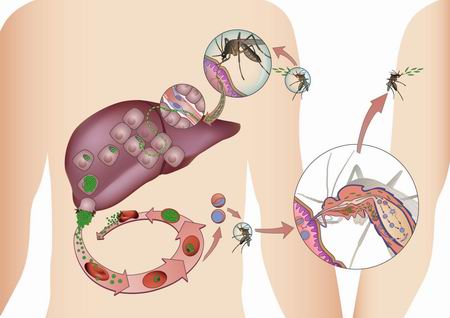Malaria Information
Click here to scroll to the list of available medications ↓
Malaria is a very serious disease that can cause months of illness and even death. Malaria is most common in regions with tropical and subtropical climates such as the Middle East, South America, Africa, Asia, and Central America. Malaria cases in the United States are most often cases that the traveler returned with from overseas. Anti-malaria medication is available to help prevent this.
Symptoms of malaria are likely to include a high fever, shaking chills that can be very severe, profuse sweating while the body temperature plummets, a general feeling of discomfort, diarrhea, headaches, nausea, and vomiting.
Malaria is an infectious disease which is caused by a parasite. The parasite is spread by the mosquito, who remains mostly unaffected by the parasite. Transmission of the parasite from mosquito to human happens during a mosquito bite, where the parasite then attaches itself to a more suitable host making them very ill.

Those who have no immunity to malaria, such as young children and international travelers are more likely to experience severe malaria than those who live in regions where malaria is prevalent. A pregnant women and her unborn child are more vulnerable to malaria than non-pregnant adults. Poverty and reduced or insignificant availability to health care contributes to malaria deaths annually.
Malaria is fairly easy for physicians to recognize. In the United States, physicians will likely ascertain if there has been any overseas or out of the country travel when diagnosing malaria. Blood samples and blood smears are necessary to determine malaria presence. Blood samples taken at 6 and 12 hour intervals can determine or confirm the presence of malaria. This can also determine the type of malaria, as it is possible to be infected with multiple strains of malaria at the same time.
Most complications are related to a particular strain of malaria known as P. falciparum. It is possible to experience a blockage of blood vessels to the brain which may cause cranial swelling. Other complications may include anemia, dehydration, liver failure, kidney failure, fluid in the lungs, and a ruptured spleen. All of these complications can lead to death if not treated immediately. Whenever a patient shows signs of complication from malaria, or shows symptoms of getting worse despite medical attention, the physician should re-assess the medications being used for treatment and opt for either a stronger medication or a combination of medications. It is also recommended that the physician repeat the blood smears to be certain that the patient did not develop a second previously undetected strain of malaria.
Malaria can be treated with a variety of medications, including chloroquine, mefloquine, quinine sulfate, doxycycline, hydroxychloroquine, and a combination of atovaquone and progaunil. There are a host of malaria medications in other countries that have not been approved for use in the United States, many of them are more effective. They are designed to be effective in smaller dosages for patients who can not get regular health care and do not have access to hospitals.
For malaria patients world wide, malaria makes a person very ill, and bed rest and ample fluids are necessary to keep the patient from becoming dehydrated. Many patients in third world countries die from dehydration rather than from the actual malaria. Patients in the United States have been known to die from dehydration as well, being sent home from hospitals too early only to become too ill to appropriately care for themselves. This can lead to dehydration and other complications.
The best treatment for malaria is prevention for travelers from the United States and other temperate climates. Anti-malaria medication can be received from a physician prior to travel into areas that are likely to have infected mosquitoes, which is likely to prevent a traveler form returning with malaria, or worse yet, contracting malaria while out of the country with limited access to health care and hospitals. Not all overseas hospitals will accept American or other foreign health insurance. However, in the United States, England, and other first world countries it is rare for patients to die from just malaria. Patients with other health complications are at risk of serious complications. Most patients in first world countries are able to slowly recover from malaria.